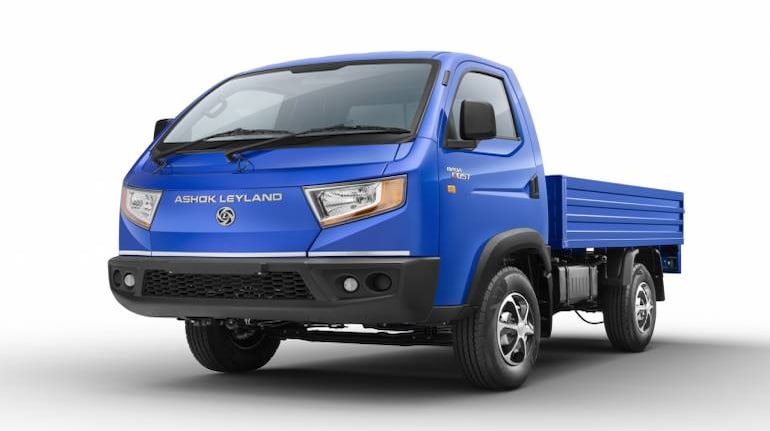
Ashok Leyland launches new LCV Bada Dost to target Mahindra Bolero
Priced at Rs 7.75 lakh, the Bada Dost is positioned at a segment above the regular Dost light truck. Company expects vehicle to raise its market share in LCV segment by up to 65 percent in 2-3 years. Currently, it has a 34 percent market share.
by Moneycontrol NewsAshok Leyland has launched Bada Dost, a single cab, light truck developed on a completely new platform to take on the segment leader Mahindra Bolero pick-up.
With a starting price of Rs 7.75 lakh (i3 LS), the Bada Dost is positioned at a segment above the regular Dost light truck, which was developed by the joint venture between Ashok Leyland and Nissan. Three other variants are priced at Rs 7.95 lakh (i3 LX), Rs 7.79 lakh (i4 LS) and Rs 7.99 lakh (i4 LX).
The new vehicle will address a near-white space in the light commercial vehicle (LCV) segment dominated by Mahindra & Mahindra (M&M).
Meet Bada Dost
The Bada Dost will be offered in two variants – 2.49 and 3.49 tonne gross vehicle weight (GVW) -- powered by an 80hp BS-VI diesel engine. The regular Dost has a GVW of 2.5 and 2.8 tonnes.
It will be the first Ashok Leyland product addressing the LCV segment developed on its own platform. The Chennai-based CV maker invested Rs 350 crore into the product and began work on it in 2017. The Bada Dost will be sold through 570 touch points of the company.
The light truck has three seats instead of the usual two certified by the Automotive Research Association of India. Ashok Leyland claims that the Bada Dost has several ‘car-like features’, which are a first for the segment driving up the USP quotient.
Dashboard-mounted gear lever, provision for music system, USB provision for mobile charging, digital instrument cluster, dual tone dashboard, doors equipped with bottle holders, dual glove box, reverse parking assist and LED tail lamps, to name a few.
Market share in LCV segment to rise
Speaking to Moneycontrol, Nitin Seth, Chief Operating Officer, Ashok Leyland, said: “In the LCV segment, we enjoy only 34 percent of the market. Obviously, your market share cannot go beyond 18 percent if you have a limited product portfolio. With the launch of the Bada Dost, our addressable market goes up to 65 percent in 2-3 years”.
As per Society of Indian Automobile Manufacturers (SIAM) data, the market size for light trucks in the 2-3.5 tonne segment is the biggest in the entire LCV segment, generating volumes of 2.32 lakh units as at the end of FY20.
M&M’s Bolero range controls 65 percent of the 2-3.5 tonne segment, where the Bada Dost is being introduced.
Though the segment contracted by 17 percent, it was lesser than the total LCV sales fall of 21 percent and the total CV segment sales decline of 29 percent in FY20.
Ashok Leyland, with the Dost, dislodged Tata Motors in FY21 in the same segment, with a share of 18 percent. At 15 percent, Tata Motors market share slipped the most despite products like the Super Ace and Yodha.
As per Ashok Leyland’s predictions, the sub 7.5-tonne (goods + passenger) segment is expected to increase to 6.55 lakh units a year by FY25 after closing the current year (FY21) at 3.91 lakh.
Global aspirations
Ashok Leyland has designed the Bada Dost to accommodate the left- hand drive (LHD) option, allowing it to address markets outside India, too. About 80 percent of the world market is left-hand driven. The Bada Dost will be exported to markets like Africa, SAARC, Gulf countries and ASEAN.
“For the next two years, every three months, you will see something coming out from this platform. We can do a variety of applications on this platform such as cargo vans and ambulances. In three months, we will have a left-hand drive. We are attempting various emission norms with this vehicle, such as BS-III, BS-IV, BS-VI, CNG for Delhi and also an EV (electric vehicle),” added Seth.
As of FY20, less than 4 percent of Ashok Leyland’s production was exported at 1,570 units from the LCV segment. Though Seth did not provide details of the company’s aspirations, he did not rule out the possibility of the Bada Dost clocking more sales outside of India than within the domestic market.